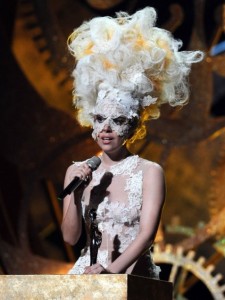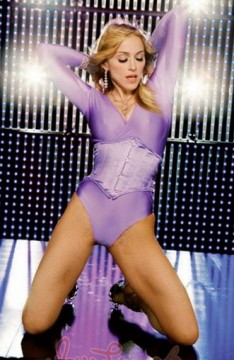
The main difference between how women should be portrayed in video games and how they actually are is a lot like the difference between Madonna and Lady Gaga. And yes while I sense many of the painfully stereotypical male readers of Nintendojo are already running for the hills to nurse their Iron Maiden collection, stick with me here.
In many ways, Madonna and Gaga represent two sides of the same disco-fabulous coin. Not only have both used their sexuality and persona to help channel themes of empowerment and equality into their music, but they both also have the tendency to go off the media rails now and again, ranging from kooky religions to kookier outfits. (Although Lady Gaga has yet to go shopping for infants in deprived countries, so let’s say Madonna is still out ahead in the freaky stakes.)
 However there is one key difference between these two icons of music and it really just comes down to sex. (The Nintendojo faithful have now had their interested reinstated.)
However there is one key difference between these two icons of music and it really just comes down to sex. (The Nintendojo faithful have now had their interested reinstated.)
Sure, both Madonna and Lady Gaga push not only the boundaries of decency and femininity with some of the stuff they’ve done in their career. But while Madonna tends to use her gender as a way of selling and defining herself in an obvious, widely accessible way (feel free to look at the conical knockers, making out with Britney or those leotards as fine examples), Lady Gaga uses her sexuality in a far less obvious, less socially digestible manner.
Perhaps because of the graphic and sometimes obscenely sexualised nature of Gaga, it’s very hard to accept it and absorb it into the wider perspective we have of her as a celebrity, artist and person. Somehow, the persona of Lady Gaga the musician and the leader of a generation of the excluded has managed to remain untarnished by the morally questionable, larger than life stage presence that emanates from her with every maddening turn her life takes. Despite being potent, aggressive and unremitting, it appears the singer’s sexuality has still remained within her control and thus within her power to wield. Even if she did appear in the “Telephone” video wearing nothing but some “Caution: Crime Scene” tape preserving her (questionable) modesty, it’s rather hard to look at those images and feel aroused by them, let alone be comfortable with them.
Lady Gaga perhaps explained this best when she remarked, “It’s not what straight men relax over when they’re at home watching pornography. It’s not for them. It’s for… us.” Add this to the mere fact that this is the woman who let rumours of her being born with incorrect sexual organs substantiate for such a ridiculous length of time, and you soon have proof enough that Lady Gaga isn’t aiming to become a sexual object anytime soon. (Yes, she didn’t say “relax” there, but I’m sure you can imagine what she did say.)
You’re probably wondering what on Earth all of this has to do with women in video games. Well, unsurprisingly, it’s got lots to do with it, otherwise I wouldn’t have been waffling about Gaga for no reason other than quite liking her. (Though I do quite like her.) No, the main problem with women in video games is that they’re too much like Madonna and not enough like Gaga. But I sense I’m going to have to explain this in a bit more detail.
Traditionally, female video game characters have always used their sexuality as a defining and reassuring aspect of their persona, whether they are kidnapped princesses or promiscuous spies/witches/kung fu masters/delete as applicable. Whatever role in the game they happen to play is counterbalanced by that character’s sexuality as a way of softening the alienation male gamers are thought to traditionally feel to women characters.
 Because a long time ago it was decided that gamers were all unwashed, sweaty middle-aged men who couldn’t understand the mysteries of womanhood and to stop then squealing in horror whenever a troubling (imaginary) girl turned up in the story, developers would just programme her to conform to the male stereotypes of womanhood and everything would be plain sailing. If she were an innocent or evil or confusing or mysterious kind of character, artists, writers, programmers and then gamers would always look to her sexuality first as a litmus test of what the character would be like. And what the character would be like would either be a sex crazed maniac or a maternal, innocent figure so dowdy she may as well be a nun, two extremes that men probably understand very easily, simply for the fact that they aren’t realistic.
Because a long time ago it was decided that gamers were all unwashed, sweaty middle-aged men who couldn’t understand the mysteries of womanhood and to stop then squealing in horror whenever a troubling (imaginary) girl turned up in the story, developers would just programme her to conform to the male stereotypes of womanhood and everything would be plain sailing. If she were an innocent or evil or confusing or mysterious kind of character, artists, writers, programmers and then gamers would always look to her sexuality first as a litmus test of what the character would be like. And what the character would be like would either be a sex crazed maniac or a maternal, innocent figure so dowdy she may as well be a nun, two extremes that men probably understand very easily, simply for the fact that they aren’t realistic.
If characters like Princess Peach are dressed to the ankle in innocuous pink dresses, sound as innocent as a four-year-old and come off completely helpless, then we instantly have a whole list of preconceived, uninspired ideas about them, just as we do about the scantily clad women of games like Bayonetta and Dead or Alive Xtreme Volleyball. Using the sexuality of female characters as a way of docilely presenting them to the stunned, male gamer is not groundbreaking narrative or fully fleshed character design; it’s just really lazy.
And while these are of course extremes on the scale of women’s portrayal in video games, it’s only the extremes you remember in such a crowded market as video games or music. Very few of you are likely to remember the far more mainstream styling of Madonna in the videos for “Don’t Tell Me,” “American Pie” or “Ray of Light,” just as most people still remember any moment in the last five years when they saw a women pushing fifty years of age in a bright purple leotard that drew far too much attention to her crotch. Crude as it may have seemed at the time, it was the effective equivalent of Madonna’s crotch taking an advert out in the paper, saying, “Look at me! I’m far more important than anything the mouth may actually be saying about the world or anything else!”
Instead, female video game characters (well those who design them) should be trying to make as big an impact through how they act, how they behave and what they have to say as through their appearance. Part of this problem is undoubtedly due to the lack of women in the leading roles of games, often leaving only the role of eye candy left in the dressing up box. And with gamers allegedly not understanding women and big name developers such as Activision canning games with women at the helm because they don’t sell, there may not be an immediate fix to how women are seen as sexual objects by default in games.
So why not try and be a bit more Gaga then? If you’re going to be an obviously sexualized woman in a video game then you may as well try and make a statement while you do it. If Bayonetta were destroying the legions of misogyny rather than heaven, would we not feel more empathy for her? If the girls from Dead or Alive were fighting for equality and an end to oppression could we not perhaps hold a little more faith in their adjustable bosoms than we do at present?
The recent history of video games has taught us that sexualized women are victims of their own appeal. Female video game characters have been conditioned into being born from the idea that if you are sexy and have a low cut top and voice that sounds like it’s been cut straight from a $2.99/minute sex phone line, then you are doomed to be trapped in these conventions and fated to nothing more than hopeless, self-ironic ogling.
 But just as feminists around the world burned their bras and dared to flaunt their flesh in an attempt to gain attention and power, Lady Gaga has successfully managed to use her sexuality as a weapon against conformity and the preconceived notions that artists like Madonna have been actively reinforcing for decades. If female video game characters are going to look like they fell out of a Playboy spread, then the least they could do is stand up for something more important than a decent fitting bra in the process.
But just as feminists around the world burned their bras and dared to flaunt their flesh in an attempt to gain attention and power, Lady Gaga has successfully managed to use her sexuality as a weapon against conformity and the preconceived notions that artists like Madonna have been actively reinforcing for decades. If female video game characters are going to look like they fell out of a Playboy spread, then the least they could do is stand up for something more important than a decent fitting bra in the process.
Lady Gaga is one scary character, without question. Any individual who can write anthems that instantly defined a generation, be rumoured to have been born with a penis and still go on to ask Cher to hold her meat purse for her deserves not only admiration but respect and fear. It’s that combination of lust, equality and power that female video game characters need to gain.
If you were to ask Madonna to dance at a hypothetical mega-superstar nightclub, she’d probably brush you off politely before walking off into the darkness, leaving you slightly taken aback but with ego intact. However if you were to try the same thing with Lady Gaga, I get the idea that she’d take you on and grind you into dust in the process before walking off with a low cackle. If female video game characters mastered the ego-massaging approach of Madonna a long time ago, it’s the raw self belief and take-no-prisoners demeanour of Gaga that’s now long overdue in the world of gaming.
Cooking Gaga artwork at the top of story created by CapitanNathan.




 ShareThis
ShareThis







Please god no. That would be awful. Also if you haven’t read Paglia’s article about how Gaga is a manufactured fraud unlike Madonna you should.
But it’s not so much about what they sound like or whether they’re manufactured or not, it’s the message they evoke through their personas and how they use their sexuality to do that. Even if Lady Gaga was built in a laboratory, in which case they built an incredibly talented musician and artist, she still stands up far more powerfully for equality than Madonna ever has because she’s not self sabotaging with the way she presents herself.
All of Gaga’s mad, crazy outfits and bizarre antics are probably just a device. But it’s not just a device to sell records, all of that abstract craziness is used to intimate and challenge social norms and that’s exactly what female video game characters should be doing too.
Your masthead is amazing. I’m not much for Madonna, so I won’t comment on the subject itself though :P
Very nicely written article, I really enjoyed reading it. Still, I can’t say I agree. The whole point is female characters challenging social norms and fighting for equality, right?
See, I think Chun Li (just one example) did that back in 1991. Challenging social norms? she was the first female playable character in a fighting game. Sure, she was too busy trying to avenge her father’s death to actively promote equality, but isn’t beating a dozen of men with her bare hands indirectly promoting equality? And all of that with no crazy outfits (which would get in the way during a street fight) and no unnecessary scandal.
I can understand why people like Lady Gaga, but she’s actually no different than any other pop star in my opinion, it’s just that she’s unusually crazy and oversexed. I don’t think it matters who she’s targeted at, she’s practically a sex object with her sex fueled lyrics and artsy-orgy music videos. It’s fine if she wants to do that, but I don’t see how that equals fighting for equality.